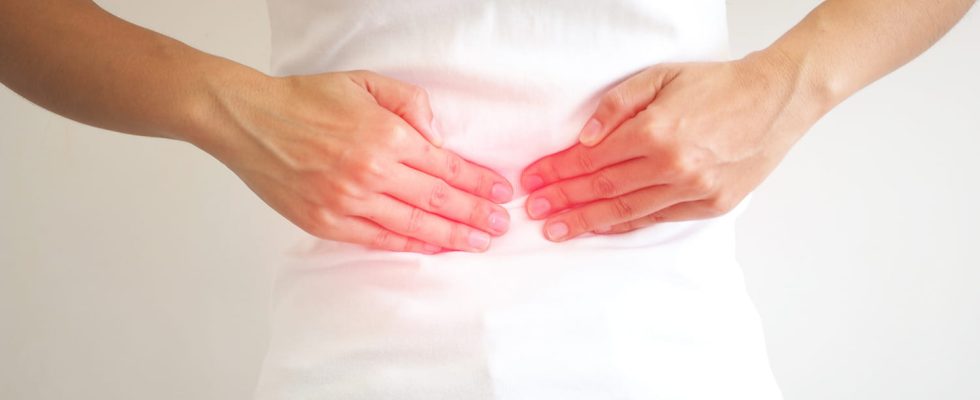Functional bowel disease (or irritable bowel syndrome) refers to a chronic disease of the intestines. Women are more affected. Symptoms, causes, treatment, diet…
THE colon is an organ of the digestive tract located between the small intestine and the rectum. Several pathologies can affect the colon such as functional colopathy. She would touch 5% of the French population, particularly the womenyouth, between 20 and 40 years old. anxiety is a factor predominant in people with irritable bowel syndrome.
What is functional colopathy (or irritable bowel syndrome)?
There functional colopathy Or “irritable bowel” East chronic bowel disease. “Functional colopathy is defined by the Rome IV criteria like a “chronic abdominal pain, at least one day a week for the past three months“, recalls Professor Benoît Coffin, Gastroenterologist at Louis Mourier Hospital. Colopathies are said to “chronic” when they have been evolving for more than 6 months. Their treatment varies according to their origin but is based above all on a healthy lifestyle and a balanced diet.
What are the symptoms of functional colopathy?
Irritable bowel syndrome is characterized by chronic abdominal pain associated with at least two of the following signs :
- relief when passing stools
- change in stool shape and consistency (constipation, diarrhea)
- change in stool frequency
Colopathy can be accompanied by:
- significant pain that can radiate to the back or the root of the thighs,
- heartburn, cramps, bloating, and unexplained weight loss
- migraine, insomnia, fatigue, anxiety attacks and states of anxiety,
- spasmodic type pain, that is to say resembling tightening of the colon whose seat is located on the path of the colon,
- interstitial cystitis and pain during intercourse
- fibromyalgia
What are the causes of functional colopathy?
Several hypotheses have been put forward to explain the origin of functional colopathy, explains Professor Coffin:
► Visceral hypersensitivity is diagnosed in nearly two out of three patients, hence the current name “irritable bowel syndrome”.
► One digestive motility disorder,
► Poor integration of pain in the central nervous system,
► One disorder of the microbiota intestinal,
► Malabsorption of bile acids,
► The role of diet, or inflammation often triggered by acute infectious phenomena
► The role of stress and psychosocial factors “which are most likely mediated by micro-inflammatory mechanisms“, specifies the gastroenterologist.
What to eat when you have irritable bowel syndrome?
“There has been quite a big revolution in recent years, especially in identification of the role of gluten : it has been shown that when gluten is reduced, the symptoms decrease with it. This is how the low FODMAP diet“, explains Professor Coffin. FODMAP is an acronym for a group of short-chain carbohydrates found in certain foods. Little or badly absorbed by the intestine, they retain water and ferment once in the colon. This diet includes the exclusion of fermentable foods such as cabbage to prevent overproduction of gas. Lactose is also to be avoided. Some fruits or vegetables are also eliminated because they are too rich in fiber and fructose, such as apples and pears. “This diet should be strictly followed for 4 to 6 weeks. Then expand gradually, so that each patient determines their “threshold dose”, the one that is most effective“, details the practitioner.
“In first intention, we will prescribe antispasmodics. If they are not effective, and the pain is severe, do not hesitate to use drugs that will act on the pain, such as antidepressants low-dose tricyclics“, explains Professor Coffin.
Probiotics
You can also use probiotics. “A large number of probiotics are available in pharmacies. But only a few of them have shown efficacy in serious clinical trials.“, warns the gastroenterologist. And to warn: “Csome are akin to outright scams. We must beware of all these miracle solutions. Colon hydrotherapy, for example, is dangerous, and cases of death have been reported. So beware of charlatans!“.
What are the natural treatments for functional colopathy?
Alternative techniques like hypnosis were also able to show efficacy in reducing pain. Others, on the other hand, such as acupuncture or phytotherapy (plants)did not show no efficiency.
Thanks to Professor Benoit Coffin, Gastroenterologist at Louis Mourier Hospital (Colombes).
